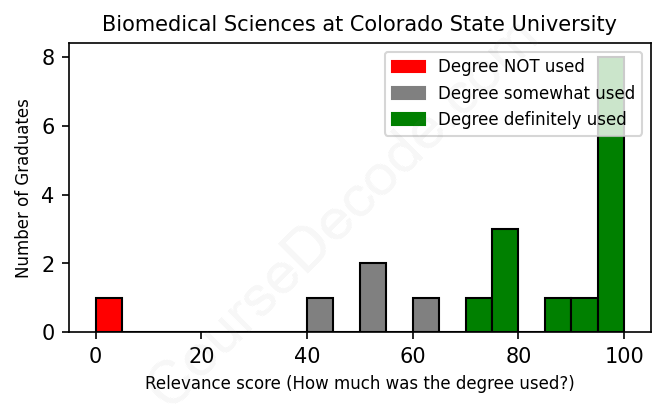
First, some facts. Of the Biomedical Sciences graduates from Colorado State University we've analyzed , here's how many have used (or NOT used) their degree in their career:

These are estimates based on AI analysis of 19 LinkedIn profiles (see below).
The verdict? Above average. Overall, with an average relevance score of 77%, Biomedical Sciences graduates from Colorado State University have a higher likelihood (+10%) of finding work in this field compared to the average graduate across all fields:
And for comparison, here's the chart for all profiles we've looked at across all degrees.
Also, after graduating, 63% of these graduates have pursued further education other than another Bachelor's degree (such as a Masters degree or other), compared to the average across all profiles of 35%. This suggests you may need more than just a Bachelors degree to be competitive as a Biomedical Sciences graduate.
See the details:
|
Relevance score: 77% We think this person has gone into a career highly relevant to their degree. We think this person has gone into a career highly relevant to their degree.
DEGREE INFOGraduated in 2021 from Colorado State University with a Bachelor's degree in Biomedical Sciences. Also pursued further education since (see below). JOB HISTORY SINCE GRADUATIONResearch Assistant Biomaterials Research and Engineering Lab Feb 2022 - Jun 2023 Manufacturing Associate I  AGC Biologics Jul 2023 - Present FURTHER DEGREES DONE SINCE GRADUATINGMaster's degreeColorado State University 2021 - 2022 ABOUTI have a Bachelor's degree in Biomedical Science and a Master's in Biomedical Engineering from Colorado State University. I am passionate about biotechnology and advancements made in the field. |
The top 10 most common jobs done by the graduates we've analyzed (ranked most common to least) are:
When looking at the careers of graduates from Colorado State University with a degree in Biomedical Sciences, there's a strong trend towards roles in healthcare and research. Many have taken positions as Research Assistants, Clinical Research Scientists, or in veterinary roles like Associate Veterinarians and Veterinary Nurse Anesthesia Team Leads. These jobs often align well with the skills and knowledge obtained during their studies, especially those that involve critical thinking and hands-on application of biological principles.
However, not all paths lead directly back to the field of Biomedical Sciences. Some graduates have ventured into roles that only tangentially connect, such as marketing, education, or administrative positions. For instance, being a Medical Assistant or a Medical Scribe allows for practical application of biomedical concepts, while teaching roles or managerial positions at non-scientific organizations don’t really require the specialized training from that degree. Overall, while many graduates have successfully found relevant roles that put their Biomedical Sciences knowledge to good use, a fair number have also taken steps into positions that are less directly related to their educational background.
Here is a visual representation of the most common words in job titles for Biomedical Sciences graduates (this is across all Biomedical Sciences graduates we've analyzed, not just those who went to Colorado State University):

Graduates with a degree in Biomedical Sciences from Colorado State University seem to embark on a variety of career paths, generally relevant to their field of study. For many, the first job after graduation often involves positions like research assistants, lab technicians, or roles within the medical field such as nursing assistants and medical scribes. These positions allow them to gain hands-on experience in healthcare, research, or laboratory environments immediately after school. Over the next five to ten years, many of these alumni transition into more specialized roles, such as clinical psychologists, veterinary practitioners, or positions in public health and research science. It's not uncommon to see a progression from entry-level healthcare positions to advanced roles like physician assistants or clinical research scientists, indicating a strong alignment with their educational background.
That said, there are also some graduates who stray from traditional Biomedical Sciences careers. A few have ventured into teaching, roles in marketing or even landed in completely different fields such as land conservation. Despite these diversions, many maintain a connection to healthcare or life sciences in some capacity, reflecting the diverse opportunities available to graduates. Overall, while some graduates may face challenges in securing roles directly tied to Biomedical Sciences, a significant number find successful and meaningful careers that leverage their education, with many continuing to grow and specialize in their chosen fields over the years.
Getting a Bachelor’s degree in Biomedical Sciences can be pretty challenging, but it really depends on your strengths and interests. At Colorado State University, you'll tackle a lot of tough subjects like biology, chemistry, and anatomy, which can be demanding if those aren’t your favorite. The workload can feel heavy at times, especially with labs and projects that require a lot of attention. However, if you’re passionate about the subject and ready to put in the effort, it can also be really rewarding. Overall, it's on the tougher side compared to some other bachelor degrees, but with the right mindset and a good support system, you can definitely handle it!
Most commonly, in the LinkedIn profiles we've looked at, it takes people 4 years to finish a Bachelor degree in Biomedical Sciences.
Looking at the career paths of these Biomedical Sciences grads from Colorado State University, it seems like they’re getting into a decent range of jobs, but it's a mixed bag in terms of salary. Some, like the Associate Veterinarian and Clinical Research Scientist roles, generally pay pretty well, especially in the long run. However, there are others in entry-level positions like medical assistants and teacher roles that might not lead to the highest earnings initially. The postdoctoral and research positions tend to have longer-term earning potential, but they often start lower compared to more established roles in medicine or veterinary science. So, while some folks are on the path to earning decent salaries, others might hit some bumps along the way before landing those better-paying gigs.
Here is a visual representation of the most common words seen in the "about" section of LinkedIn profiles who have a Bachelor degree in Biomedical Sciences (this is across all Biomedical Sciences graduates we've analyzed, not just those who went to Colorado State University). This may or may not be useful:

Here are all colleges offering a Bachelor degree in Biomedical Sciences (ordered by the average relevance score of their Biomedical Sciences graduates, best to worst) where we have analyzed at least 10 of their graduates:
| College | Score | Count |
|---|---|---|
 Western Michigan University Western Michigan University
|
81 | 17 |
 Marquette University Marquette University
|
78 | 29 |
 University of Michigan University of Michigan
|
77 | 10 |
 Colorado State University Colorado State University
|
77 | 19 |
 University at Buffalo University at Buffalo
|
75 | 18 |
 California Polytechnic State University-San Luis Obispo California Polytechnic State University-San Luis Obispo
|
74 | 13 |
 University of Connecticut University of Connecticut
|
74 | 15 |
 Texas A&M University Texas A&M University
|
73 | 59 |
 Auburn University Auburn University
|
71 | 26 |
 Northern Arizona University Northern Arizona University
|
71 | 15 |
 Rensselaer Polytechnic Institute Rensselaer Polytechnic Institute
|
70 | 10 |
 University of Central Florida University of Central Florida
|
69 | 26 |
 University of South Florida University of South Florida
|
68 | 48 |
 Georgia Institute of Technology Georgia Institute of Technology
|
67 | 41 |
 The Ohio State University The Ohio State University
|
64 | 14 |
 Rochester Institute of Technology Rochester Institute of Technology
|
64 | 12 |
 Case Western Reserve University Case Western Reserve University
|
63 | 12 |
 Grand Valley State University Grand Valley State University
|
59 | 35 |
 Arizona State University Arizona State University
|
58 | 12 |